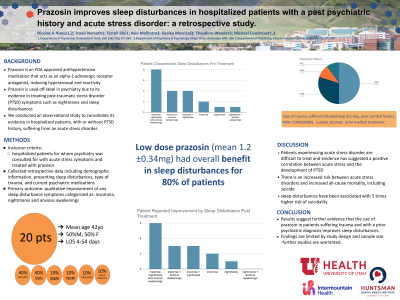Psychopharmacology and Toxicology
(147) Prazosin improves sleep disturbances in hospitalized patients with a past psychiatric history and acute stress disorder: a retrospective study.

- NN
Nicolas A. Nunez, MD
Resident physician
Department of Psychiatry, University of Utah
Salt Lake City, Utah 
Travis Norseth, MD
Resident
Psychiatry/University of Utah
SLC, Utah
Michael F. Coudreaut, MD
Volunteer Clinical Faculty
University of Utah
Salt Lake City, Utah
Terrell K. Blei, MD
Resident Physician
University of Utah
Salt Lake City, Utah- TW
Theodore J. Wander, MD
Physician
Intermountain Health
SLC, Utah - KM
Keeley Morrical, LSCW
Social Worker
Intermountain Health
Salt Lake City, Utah
Presenting Author(s)
Co-Author(s)
Background: Prazosin, an FDA-approved antihypertensive, is utilized off-label in psychiatry, particularly for treating PTSD symptoms like nightmares and sleep disturbances (Belkin et al., 2015; Raskind et al., 2013; Singh et al., 2016). This observational study aimed to assess its efficacy in patients with acute stress disorder.
Methods: Twenty hospitalized patients (mean age 42.05 ±11.74; 50% male) were included. Most had previous psychiatric diagnoses, primarily major depressive disorder (50%) and PTSD (30%). Traumas varied, with ICU stays (25%) and combat history (20%) among the common types. Medication history included SSRIs (40%) and prazosin (10%). Sleep disturbances comprised insomnia, nightmares, and anxious awakenings.
Results: The mean hospitalization duration was 22.9±14.89 days, with a mean prazosin dose of 1.2±0.34 mg. Overall, 80% of patients showed sleep improvement, with varying degrees of improvement across different sleep categories.
Discussion: The study underscores the challenges of treating acute stress disorder. There is an association with the development of PTSD, which has an increased mortality risk - including suicide (Rod et al., 2011). Sleep disturbances also significantly elevate the risk of suicidality (Gao et al., 2023). Prazosin demonstrated benefits in alleviating sleep disturbances and hyperarousal states, potentially reducing subsequent PTSD development and enhancing overall treatment outcomes.
Conclusions: This study suggests that prazosin may effectively alleviate sleep disturbances in trauma patients with prior psychiatric diagnoses. These findings are limited by study design and sample size although further studies are warranted.
References:
1. Belkin MR, Schwartz TL. Alpha-2 receptor agonists for the treatment of posttraumatic stress disorder. Drugs Context. 2015;4:212286. doi:10.7573/dic.212286
2. Raskind MA, Peterson K, Williams T, et al. A trial of prazosin for combat trauma PTSD with nightmares in active-duty soldiers returned from Iraq and Afghanistan. Am J Psychiatry. 2013;170(9):1003 1010. doi:10.1176/appi.ajp.2013.12081133
3. Singh, B., Hughes, A. J., Mehta, G., Erwin, P. J., & Parsaik, A. K. (2016). Efficacy of prazosin in posttraumatic stress disorder: a systematic review and meta-analysis. The primary care companion for CNS disorders, 18(4), 26306.
4. Srivastava AA, Opler DJ. Clinical Use of Prazosin in a Patient With Acute Stress Disorder: A Case Report. J Psychiatr Pract. 2020;26(3):246-248. doi:10.1097/PRA.0000000000000468
5. Gao X, Wang Z, Guo L, et al. Consensus on the pharmacological treatment of acute stress disorder in Chinese pilots: a Delphi study. BMC Psychiatry. 2023;23(1):664. Published 2023 Sep 8. doi:10.1186/s12888-023-05145-5
Presentation Eligibility: Not previously published or presented
Diversity, Equity, and Inclusion: This work addresses an at-risk group of patients - trauma victims or those at risk of developing trauma disorders, who disproportionately come from marginalized groups.

